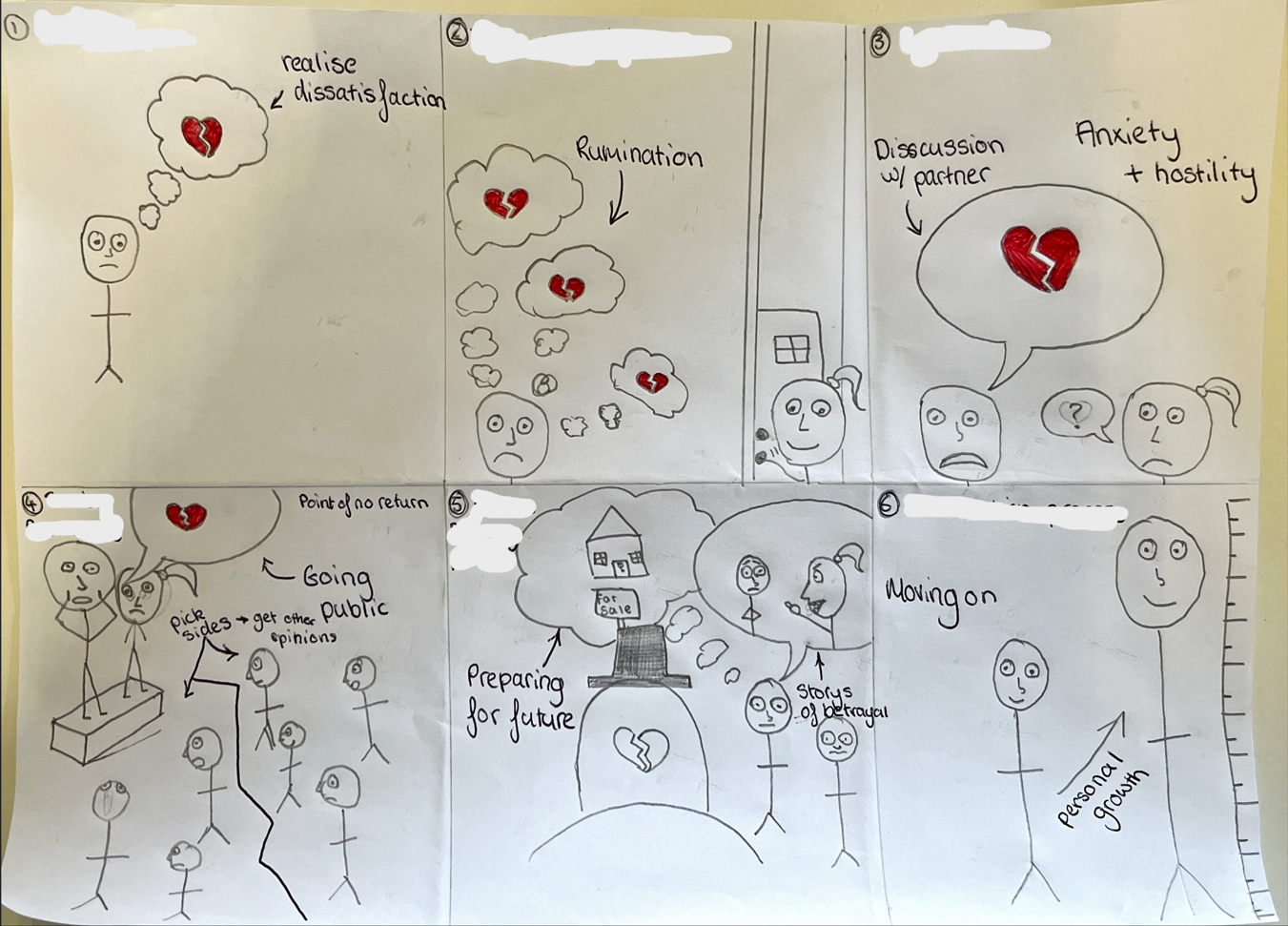Duck's Phase Model (Theories of Romantic relationships)
1/11
There's no tags or description
Looks like no tags are added yet.
Name | Mastery | Learn | Test | Matching | Spaced |
|---|
No study sessions yet.
12 Terms
Theories of Romantic relationships - Duck's Phase Model
What is DPM?
DPM (1982)
a model of relationship breakdown → not a one-off event, but a gradual process w/ distinct phases
Each partner reaches a threshold: perception of relationship changes → become dissatisfied
Theories of Romantic relationships - Duck's Phase Model
What’s the first phase?
Intrapsychic phase:
Realises dissatisfaction
social withdrawal, rumination about how they would be better off not in the relationship, resent their under-benefitting
Threshold: ‘I’m justified in leaving’
Theories of Romantic relationships - Duck's Phase Model
What’s the second phase?
Dyadic phase:
discussion of unhappiness w/ partner → Anxiety, hostility, complaints, may become aware of the things that bind them together (eg: children, house) and costs of relationship ending (eg: social/economic) → if both are willing to try and save the relationship may go to couples councilling
Threshold: ‘I mean it’ - v serious about leaving
Theories of Romantic relationships - Duck's Phase Model
What’s the third phase?
Social processes:
going public, discussing with friends and family, building alliances, hard to deny problems w/ relationship and reconcile
POINT OF NO RETURN
Threshold: ‘it’s inevitable’
Theories of Romantic relationships - Duck's Phase Model
What’s the fourth phase?
Grave-dressing process:
organising post-relationship life - make themselves look presentable/loyal to attract future relationships, stories about relationship (eg: betrayal) that makes their contribution to the breakdown look favourable (La Guipa (1982) - need to leave w/ their ‘social credit’ in tact). May reinterpret view of partner (eg: rebellious (attractive) → irresponsible (unattractive)
Threshold: ‘time to get a new life’
Theories of Romantic relationships - Duck's Phase Model
What’s the fifth phase?
Resurrection process (added 2005):
period of personal growth + learning, overcoming distress of the breakup
Threshold: ‘time to get over it’

Theories of Romantic relationships - Duck's Phase Model
Fill in the blanks
breakdown (part of intra-psychic)
Intra-psychic phase
Dyadic phase
social processes
grave-dressing phase
resurrection process
Theories of Romantic relationships - Duck's Phase Model
Evaluation: Culturally biased
Moghaddam et al. claim models of relationship breakdown like Duck’s = culturally biased → overwhelmingly focus on individualist culture experiences (esp US) → Moghaddam claims relationships end more frequently + voluntarily in individualistic vs collectivistic where bonds b/w extended family + obligations b/w partners → relationship breakdown = v different → DPM maybe culturally bound
DTheories of Romantic relationships - Duck's Phase Model
Evaluation: descriptive not explanatory
DPM criticised bs only describes process, not explains why relationships might end → SET: by the costs of relationship outweighing benefits → ET: perceived equity of relationships and over/under benefitting → SO suggests = incomplete
Theories of Romantic relationships - Duck's Phase Model
Evaluation: Support
Tashiro + Frazier (2003) surveyed 92 undergraduates who recently had break ups → reported they experienced emotional distress during, and then personal growth → evidence of stages predicted in DPM
Theories of Romantic relationships - Duck's Phase Model
Evaluation: impact of social processes phase varies
nature/impact of the social phase depends on type of relationship → for teenagers/young adult’s seen as more unstable than LT adult relationships, largely recognised by others as testing grounds for future relationships SO may receive sympathy but not attempts at reconciliation from people they tell (‘plenty more fish in the see’) BUT older people in LT relationships = less expectations of finding replacement SO social phase = bigger impact (Dickson, 1995) → suggests social processes phase characterised by more attempts by others to rescue relationship
Theories of Romantic relationships - Duck's Phase Model
Evaluation: ethical issues
Research may have issues w/: protection from harm (participants may be distress revisiting issues that caused breakdown), privacy (many such issues = intensely personal) and confidentiality (esp victims of abusive relationship) → research’s benefits should > costs (esp for Ps) → difficult when dealing w/ vulnerable Ps attempting to cope w/ trauma + emo distress associated w/ breakup SO researches must carefully consider ethics in this area + if they have the Ps best interest in mind w/ their research Q